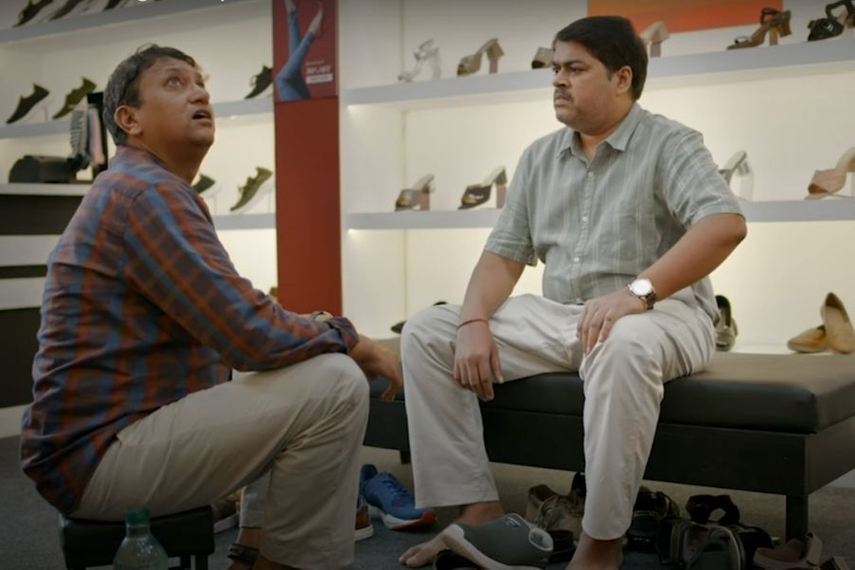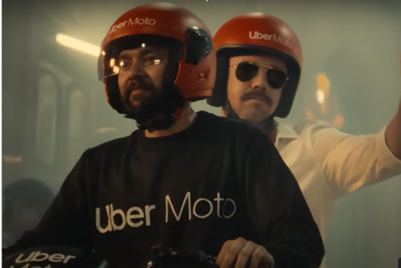
In the fast-scrolling, short-attention-span world of advertising, breaking through the noise often takes more than sleek visuals or catchy slogans. It takes relatable, authentic storytelling.
Ludic, a homegrown footwear and lifestyle brand, has embraced this mantra with its latest campaign, ‘Comfort aisa, ki ab kya batayein’ (Comfort so good, what can we say?). Conceptualised by creative agency Braindad, it cleverly uses humour and nostalgia to position the company’s sliders as the ideal blend of style and comfort.
When Ludic founder Ishit Jethwa briefed Braindad, the challenge was clear: craft a story that would resonate across demographics, highlighting the comfort and affordability of Ludic’s sliders without alienating any segment of their diverse audience. And that is when they zeroed on using humour to be the core of their marketing outreach.
"Humour cuts through demography like few other approaches—just like sliders do as a product category," Jethwa told Campaign. “While our sliders are technical with clear proprietary advantages, they are incredibly versatile from a use-case perspective. This called for a campaign that was relatable and fun without being intelligent for the sake of it. It had to centre on comfort in a way that everyone could connect with.”
A relatable storyline with a humorous twist
Great marketing isn’t just about spinning tales; it’s about spinning relatable ones that people actually believe. Ludic’s ‘Comfort aisa, ki ab kya bataayein’ campaign nailed this by wrapping nostalgia and comedy around the comfort message.

It tells the story of a customer navigating his quest for the ultimate comfort in a shoe store, sparking a comedic yet relatable dialogue with the store staff. Who in India hasn’t walked into a store where the salesman convinces a customer to try out different footwear and then talks in an alien lingo to a chap hidden in the mezzanine floor where the latest stock is kept? A glimpse of a hand tossing a box of shoes, expertly caught by the salesman, and upon the buyer’s noncommittal reply, the sales assistant sends another cryptic message and the boxes keep coming. Set in a modest, cost-conscious store environment, Ludic’s campaign narrative mirrors this everyday situation for many Indian consumers.
Of course, humour’s tricky—it can charm or alienate depending on the punchline. The challenge was to keep it empathetic enough to tickle everyone, including those shopping in the upper aisles.
"Yes, the setting was intentional," confirmed Jethwa. "It reflects the blend of aspiration and affordability that defines our product. The customer in the ad isn’t necessarily cost-conscious but represents the aspirational Indian who wants premium design and comfort without compromise." This slice-of-life scenario underscores Ludic’s positioning: premium quality need not come with a hefty price tag.
Making humour stick
Humour, as Braindad co-founder Vishal Dayama notes to Campaign, has universal appeal but is a double-edged sword. Done poorly, it risks alienating audiences or diluting the brand message. Done right, it can emotionally connect with a broad audience.
"Ludic is a fresh brand with clean aesthetics. Our challenge was to weave a humour style that aligned with this universe,” says Dayama. “Using hyperbole on a relatable situation, we kept the humour real yet captivating through exaggeration.”
The campaign’s central character and setting were equally deliberate. "We needed characters that not only embodied the relatability of the storyline but also reflected the comfort and style of Ludic sliders," Devarsh Thaker, Braindad co-founder says. "The casting was spot-on, and comfort became the perfect hook for the narrative."
One of the campaign’s more nuanced challenges was ensuring the ad’s relatability didn’t alienate Ludic’s upper-market audience. The modest store setting could have been seen as at odds with the premium aspirations of Ludic’s brand identity.
But as Thaker points out, relatability and aspiration aren’t mutually exclusive. "Nostalgia and humour are agnostic of market segments. Ludic’s appeal lies in striking a balance between premium design and emotional resonance."
Jethwa concurs, noting that the campaign’s design—from its localised product names to the Indian setting—was crafted to connect authentically with a wide consumer base. "Our sliders are designed for Indian feet, and we wanted every aspect of the campaign to reflect that authenticity," he says.
Testing the waters: Focus groups over A/B testing
Humour hooks us—be it in a meme, an ad, or even Cannes 2024’s revived comedy category. But brands can’t rely on fancy presentations or hopeful presumptions while planning a big-budget campaign. Real engagement means ditching stereotypes, listening to actual humans, and testing creative ideas until they stick. The magic lies in bold humour that’s both relatable and authentic—without making audiences cringe.

Hence, bearing in mind that humour can be a creative risk, Braindad and Ludic leaned on focus group feedback during the campaign's conceptual stage. "The concept and script scored highest in our focus groups and generated the most laughs," explains Jethwa. "This was a clear indicator that the humour would resonate."
However, Braindad steered clear of A/B testing at the execution stage. "A/B testing feels too binary for creative concepts," says Dayama. "Instead, we focused on refining the script based on qualitative insights, ensuring the exaggerated humour landed well while keeping it relatable."
The business case for a story-first approach
Ludic’s commitment to storytelling extends beyond this campaign. As Jethwa puts it, “We strongly believe in a design-forward, story-first approach to brand building. It matches the aspirational sensibilities of our audience and helps build trust.”
This transparency is also evident in Ludic’s approach to product development. "We build in the open, which means listening to our audience and incorporating their feedback into our designs. It’s a slower path, but it creates a stronger connection with our customers."
The campaign is a reminder that even the most creative advertising ideas need rigorous testing. "Brands can’t just guess what will land," says Thaker. "They need to test their ideas, listen to real feedback, and pivot when needed. Humour may grab attention, but it’s storytelling and authenticity that build loyalty."
For Ludic, the investment in creative testing and collaboration paid off. The campaign managed to strike a chord across demographics, with its playful humour and emotional resonance positioning Ludic sliders as a go-to choice for comfort and style.
With the campaign live and generating buzz, both Ludic and Braindad are already looking ahead. "Our sliders are our first mass-market entry, and we’re excited to see how they’re received," says Jethwa.
For Braindad, the campaign is another example of how creativity and strategy can work together to tell compelling brand stories. "When brands trust us to push boundaries, we can create something that not only stands out but also connects deeply with audiences," says Dayama.
In an era where customers demand both entertainment and authenticity, Ludic’s campaign shows how humour, when thoughtfully executed, can elevate a brand’s story. As Jethwa puts it, "Advertising is easier and more authentic when you genuinely love what you’re creating."
Ludic and Braindad’s collaboration is a case study in how blending humour, relatability, and strategic testing can create campaigns that entertain while staying true to the brand’s core message.


.jpg&h=334&w=500&q=100&v=20250320&c=1)
.jpg&h=334&w=500&q=100&v=20250320&c=1)



.jpg&h=334&w=500&q=100&v=20250320&c=1)


.jpg&h=334&w=500&q=100&v=20250320&c=1)
.jpg&h=334&w=500&q=100&v=20250320&c=1)


.jpeg&h=268&w=401&q=100&v=20250320&c=1)





